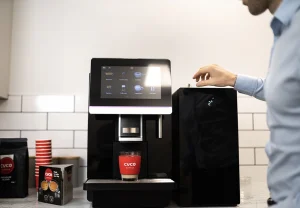We all wish we could have barista-quality coffee every day without paying $7 for it. Luckily, you can achieve that authentic taste all on your own with the right coffee machine.
Two of the most popular types of coffee machines are bean-to-cup and espresso machines. If you haven’t perfected your coffee ritual yet, picking one that fits your needs can feel tricky.
Don’t worry – we’ve conducted a thorough coffee machine comparison, so you can be one-step closer to your dream caffeine fix.
What is a Bean-to-Cup Coffee Machine?
Bean-to-cup coffee machines are automatic coffee makers that streamline the entire brewing process, from grinding whole coffee beans to dispensing a fresh cup of coffee. This machine allows for a quick and simple coffee-making experience since you don’t need to use any separate grinders, tampers, and other equipment.
How Does It Work?
Bean-to-cup coffee machines are simple to use.
You load the hopper with your favorite beans, choose your drink – maybe a latte, cappuccino, or just a classic espresso – and let the machine work its magic. It grinds the beans to the perfect consistency, packs them into the filter, and forces hot water through them. Some models also have built-in milk frothers for a more creamy texture.
What is an Espresso Machine?
Espresso machines are special coffee makers designed to brew only espresso – a concentrated coffee beverage with a rich crema. They use high pressure to force hot water through finely-ground coffee beans.
How Do They Work?
While not as versatile as bean-to-cup machines, espresso machines are also straightforward to use.
First, you add water to the machine’s boiler, which heats it to the ideal brewing temperature, typically around 90°C. Then, you put your finely ground coffee beans in the portafilter before attaching it to the group head. Finally, the pump creates high pressure, usually around 9 bars, to force hot water through the fine coffee grounds to extract the espresso.
Pros and Cons of Bean-to-Cup Coffee Machines
Pros
- Simple and convenient for effortless brewing
- Uses freshly ground beans for the perfect flavor and aroma
- Can make a variety of coffee drinks
- Compact design saves counterspace
Cons
- Pricier than other coffee makers
- Less control over brewing variables for coffee purists
- Requires regular cleaning and descaling
Pros and Cons of Espresso Machines
Pros
- Authentic coffee flavor and aroma
- Complete control over the brewing process
- Very easy to use
- Available in many sleek and stylish designs
Cons
- Can only make an espresso
- Steep learning curve for mastering the technique
- Requires more hands-on effort
Bean-to-Cup vs Espresso Machine: What is the best option?
Now that you know all about the two coffee machines and how they work, it’s time to pick one that suits your preferences. You don’t have to make that decision by yourself – here’s a complete guide to help you break down the factors.
Budget Considerations
Bean-to-cup machines generally have a higher price tag since they come with an integrated grinder. Plus, the brewing process is fully automated, and users have access to a more diverse range of beverage options. These machines essentially combine the features of a separate grinder and espresso machine into one unit, which is why they tend to cost more.
On the other hand, espresso machines can vary in cost based on their type and features. Basic manual models are pretty affordable, but they only brew one espresso at a time. High-end commercial espresso machines can be expensive, but they come with advanced features and multiple group heads.
Plus, remember that if you choose an espresso machine, you’ll also need to factor in the cost of a separate grinder. So, the price difference between a bean-to-cup and espresso machine isn’t that steep if you think about it.
Size and Space Requirements
The size and space requirements of the coffee machine are the next factor to consider. Counter space is valuable, and not just at home. Even if you’re looking for commercial coffee machines to put in your cafe or the perfect coffee machine for office use, you still need to make sure it’s compact enough to leave room for other appliances.
Bean-to-cup machines tend to be bulkier due to their integrated grinder and multiple components. While they’re not too big for high-volume settings like commercial coffee shops, they may not be the most space-efficient choice for smaller kitchens or offices with limited counter space.
Espresso machines, particularly manual models, are typically smaller. Their core components – boiler, pump, and group head – are compactly arranged. That means a classic espresso machine can easily fit into smaller office environments or home kitchens with limited space.
Hands-on vs Automatic Experience
Next, you must consider how much involvement you want in the coffee-making process. Do you love the hands-on experience of grinding fresh beans, tamping them into the portafilter, and pulling the perfect espresso shot? Or do you prefer a quick and effortless brewing experience with minimal fuss?
Bean-to-cup machines cater to those who want a quick and convenient coffee-making process to speed up their mornings. They automate every step, from grinding and tamping to brewing and dispensing, with just a touch of a button.
Espresso machines, on the other hand, offer a more immersive and hands-on experience. You’ll need to master techniques like grinding, dosing, tamping, and controlling extraction variables if you want to pull the perfect espresso shot. Many coffee enthusiasts enjoy this process as much as the final product, so this learning curve isn’t always a bad thing.
Customization and Control
If you love experimenting with different flavors and brewing parameters, an espresso machine might be your dream coffee machine. They give you complete control over variables like grind size, water temperature, and extraction time so you can fine-tune your espresso to perfection.
Bean-to-cup machines generally have preset settings and may not provide the same level of control. However, they often come with features like milk frothers and adjustable coffee strength.
Conclusion
Ultimately, there’s no formula for finding the right coffee machine. The best choice is the one that aligns with your specific needs and preferences.
Your lifestyle, budget, desired experience, and the type of coffee you enjoy play a huge role in the decision-making process. Once you’ve come to a conclusion, explore our range of options at Cuco Coffee for high-quality coffee machines at affordable rates






